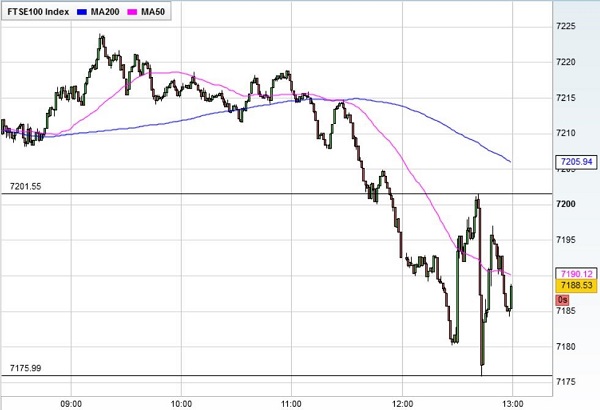Spring Statement: Hammond bullish, but FTSE 100 down
13th March 2018 15:17
by Graeme Evans from interactive investor
Share on
No matter how much Philip Hammond talks up the economy - "light at the end of the tunnel", "the best days ahead of us" - there's no escaping the fact that Britain is set for a very long period of lacklustre growth.
Spanning out before of us is projected growth of 1.5% this year, followed by 1.3% during the "Brexit years" of 2019 and 2020, rising to 1.4% in 2021 and 1.5% in 2022.
Based on today's forecasts from the Office for Budget Responsibility (OBR), that's five years of output below the long-term trend for at least 2% a year. Since the war there's never been five consecutive years of 1.5% or below.
No wonder Hammond was at pains to point out during his 26-minute, soundbite-laden Spring Statement that "forecasts are there to be beaten", as Britain managed to do in 2017 when GDP grew by 1.7%.
But compare these new OBR forecasts with the global projections just released by the OECD and Britain is very much in the slow lane. In contrast, the US economy is forecast to grow by 2.9% this year and 2.8% in 2018.
Overall, the Paris-based OECD thinks that the global economy will expand by 3.9% over the next two years, rather than the 3.6% previously expected.
At a time when the rest of the world is booming, Britain is missing out.

Source: interactive investor Past performance is not a guide to future performance
The fact that some 70% of blue-chip earnings are generated overseas will insulate the to some extent, but the prospects are much more uncertain for smaller caps and those reliant on UK services, for example.
This was reflected in a slight downward movement in the top flight and during the Chancellor's speech.
But with the UK due to leave the European Union on March 29, 2019, the truth is that no-one can be quite sure how the UK will perform. Even the OBR admits that its forecasts are based on broad-brush assumptions about the economy and public finances after the UK's exit.
The Brexit vote has slowed the economy, but by less than the OBR expected immediately after the referendum – thanks in part to the willingness of consumers to maintain spending by reducing their saving.
But given the ongoing uncertainty over exit negotiations, the OBR still has "no meaningful basis for predicting a precise outcome".
Away from the growth story, there was better news elsewhere in the OBR forecasts, with inflation due to fall to its 2% target by the end of the year and Government borrowing returning to surplus when excluding investment.
Perhaps the biggest surprise in the economic data is that productivity growth - measured as output per hour - has been much stronger than expected. But that reflects a much weaker path for average hours worked, rather than stronger output or weaker employment growth.
Ian Stewart, chief economist at Deloitte, thinks that the recent improved trend on public finances will give Hammond more firepower to support the economy if the Brexit talks don't go to plan.
But he added: "We should not get carried away. These forecasts are likely to be no less fallible than earlier ones and, despite an improving trend in public borrowing, the burden of debt in the UK is still at its highest in over 50 years.
"Today's statement means deficit reduction is, at last, on track but it does not mark the end of austerity."
Meanwhile, today's OBR figures are unlikely to do much to sway the City's thinking that interest rates will rise as early as May. Despite the weak growth prospects, the threat posed by inflation is receding and real wage growth is expected to be positive from the first quarter of 2019.
These articles are provided for information purposes only. Occasionally, an opinion about whether to buy or sell a specific investment may be provided by third parties. The content is not intended to be a personal recommendation to buy or sell any financial instrument or product, or to adopt any investment strategy as it is not provided based on an assessment of your investing knowledge and experience, your financial situation or your investment objectives. The value of your investments, and the income derived from them, may go down as well as up. You may not get back all the money that you invest. The investments referred to in this article may not be suitable for all investors, and if in doubt, an investor should seek advice from a qualified investment adviser.
Full performance can be found on the company or index summary page on the interactive investor website. Simply click on the company's or index name highlighted in the article.